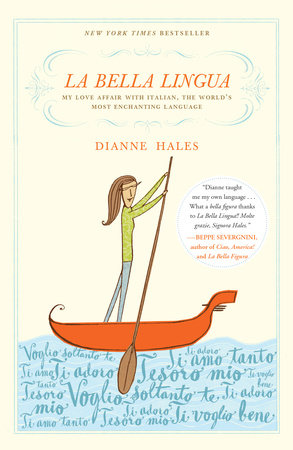TEACHING GUIDE
NOTE TO TEACHERSLA BELLA LINGUA Discussion Guide For Teachers and Students Italian is more than a language: it opens a window into Italy’s rich culture, history, traditions, art, music, cuisine, and character. Whatever your reason for teaching or studying Italian¯as part of an academic program, to rediscover family roots, for travel, business, or pleasure¯
La Bella Lingua offers a new perspective that goes beyond vocabulary and grammar. The following questions are meant to stimulate discussions that will deepen your appreciation for all aspects of the Italian language and life.
Hales traces Italian’s history back thousands of years to the
volgare, the street Latin of ancient Rome, which gave rise to all the Romance languages. In other countries the dialect of the most powerful city evolved into the national language. Why didn’t that happen in Italy? What were the consequences?
From pages 20 to 27, Hales gives examples of the wit, vitality, and versatility of Italian words. Do you have any favorites? What does the playfulness of Italian terms tell you about the language?
Hales says she resisted reading Dante’s
Divine Comedy. Can you understand why? Did her comparison of it this epic poem to Harry Potter or a Hollywood movie change the way you think of it? Why does Dante mean so much to Italians?
L’Accademia della Crusca (the Academy of the Bran), described on pages 113-121, was certainly not a conventional linguistic society. What does its creation say about Italians’ views of food and of language? Can you understand why Hales was so moved to visit La Crusca and see a first edition of
Il Vocabolario?
“
Bella figura” is one of the most complex aspects of Italian life. Hales came to appreciate it fully when she visited a dying professor. Did her chapter on “How Italian Civilized the West” provide any new insights as to why appearance and social grace matter so much to Italians?
Most people associate great Renaissance masters such as Leonardo and Michelangelo only with works of art. Did learning about their writing and their love of words add to your appreciation of these artists?
Hales contends that opera could not have emerged in any country. What do you think are the Italian qualities that contributed to this genre? Were you aware of the role Verdi’s operas played in the campaign to unify the Italian nation? Why do you think his music had such an impact?
Italian food and language, Hales says, “meld together as smoothly as
cacio sui maccheroni (cheese on macaroni).” Discuss the colorful ways that Italians use gastronomic terms in everyday conversation. What did learning the history of such universal favorites as pasta and pizza add to your appreciation of these dishes?
In “So Many Ways to Say I Love You,” Hales searches for the reasons for Italians’ love of
amore in Italian love stories. Were you surprised to find that many end tragically—including the true story of Casanova’s life? Why do you think this is so? Hales comes to share the Italian appreciation for romantic gestures. Do you think this explains her behavior with the older gentleman in Venice?
“Movies,” Hales says, “taught Italians how to be Italian.” Why does she make this assertion? Do you agree? Were you aware of the use of dubbing in movies shown in Italy? Why do you think dubbing is much less popular in the United States?
Some of the oldest and most colorful Italian terms are
le parolacce (bad or naught words). How do they differ from obscenities in other languages? Do you agree with the author of the book
Parolacce that civilization couldn’t exist without vulgarities and curses? Have Italians elevated swearing to an unconventional art form?
The Romans and their descendants, a linguist observed, thrice conquered the world: once in government, once in religion, and once in art. To this trio of triumphs, he added a fourth: language. By the end of the book, Hales comes to agree. Do you understand why she “wholeheartedly agrees that Italian is indeed the language of humanity—and therefore everyone’s mother tongue”?
Despite her many years of studying Italian, Hales still finds herself struggling to understand everyday Italian. Her tutor tells her that’s the difference between “learning Italian and living Italian.” What do you think she means? Is it possible to “live” a second language? What would it require?
Although it ranks 19th as a spoken language, Italian has become the fourth most studied language in the world. After reading
La Bella Lingua, can you understand its appeal?

